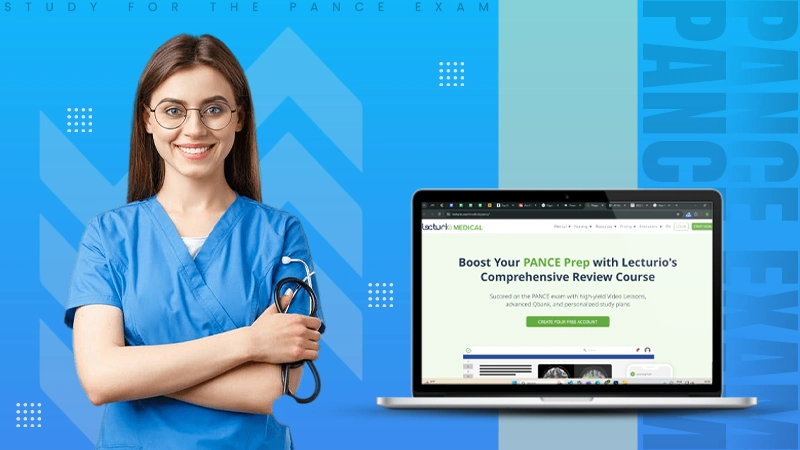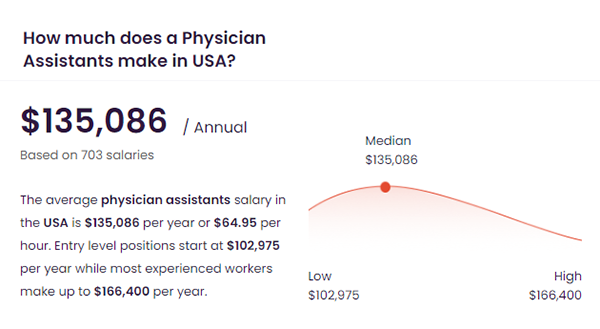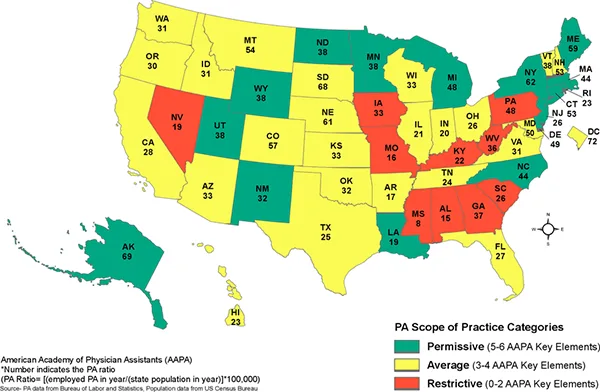
Physician Assistants, also known as PAs help share the burden on the healthcare sector created by the gap between demand and availability of qualified doctors. If one has visited the neighborhood clinic or an emergency room, there is a good chance that the patient has been reviewed by a PA.
There are several differences between a doctor and a physician assistant starting with their course format and licensure exams. Unlike medical students, PA aspirants undergo PANCE exam preparation.

Explaining all the details in a few words might become technical. Hence, this article will help you get a clearer picture in detail. Keep reading.
Getting Familiar
A PA program from an accredited college or university usually lasts 27-30 months. In this program, the student is trained to understand how to examine patients and look into diagnostic reports. They are supposed to gain practical knowledge through a twelve-month clinical rotation after their PA program.
This step is where one refines their skills and puts their knowledge to use by gaining hands-on experience in treating patients. However, you must not get overwhelmed by the work pressure as it is only for your good.
The more patients there are, the better the training in handling patient outcomes. This is the stage when it is recommended to start preparing for the licensure exam as one can critically think and apply their clinical skills in answering their exam questions.
Physician assistants, just like other healthcare professionals, provide critical patient care and will need to work long shifts with unannounced overtime. As they perform nearly seventy-five percent of a doctor’s work, they have to be trained, tested, certified, and re-certified through continuous education programs, so that they stay relevant in their field of expertise.
This is primarily the reason for conducting a licensure exam like PANCE whereby the PA’s role as a dependent practitioner will help ease the pressure on doctors who are swamped with critical patient cases. The PAs in healthcare setup take on the stable patients who need to be reviewed but are not necessarily attended to directly by a qualified doctor.
Speaking of the compensation provided by the job, you may easily earn more than 100,000 USD annually if you have the right skills and training.

PANCE Exam Details
With that introduction, here are the points to consider for the exam. PANCE is a challenging test for PA aspirants and can be cleared through effective preparation. The NCCPA administers the exam and students who have completed an accredited PA program are eligible to apply for the exam. Here are some tips for people considering PANCE this year:
Familiarize With Exam Structure
It is a single-day computer-based exam with 300 MCQs. There are five blocks of 60 questions each. One hour is allocated to complete each block. Break time is forty-five minutes in between ghee blocks with an extra fifteen minutes to review the block.
Time Management
A time-bound exam can be answered successfully only with practice. Trying to solve the questions with a stopwatch and asking a study group member to check your performance will help in evaluating your strengths and weaknesses.
You must also try taking quizzes at different times will help in retention and even reduce the time taken to answer a similar quiz. Through focused efforts achieving a good score is possible.
Consistent Efforts
Often, students neglect their schedule once they gain confidence after a few successful quiz attempts. This is a cardinal mistake usually committed by students who taste beginner’s luck. Only students who are consistent with their preparation will find the actual exam to be easy. Their strength is derived from constant preparation that helps them stay realistic and time-bound.
Study Groups Are Important
Your approach and study methods may be different from others. However, a group of like-minded students will help improve your preparation by sharing best practices.
One can learn from other group members and pick up their ideas in learning and recalling concepts. Students have been known to discard their old bad habits and acquire good ones from their friends like taking notes and staying organized.
Peer pressure offers some goodness that can rub off on PA aspirants with the same goal. You can actively seek to pick up points like communication and presentation skills from your friends.
Active Learning Methods
Using methods that will help in enhanced retention of the content is possible only when the concepts are clear. The simple act of memorizing lengthy topics will only stress a student. Using simulation videos that cover the content through animation is immersive and helps students comprehend better.
Visual aids are proven to have a long-lasting impact on memory, making it easier to recall information during exams. Other effective learning methods include using flashcards for quizzes, methods to remember difficult terms, and spaced repetition to help students succeed in any exam.
TIP:
The Pomodoro technique, which involves studying with full concentration for twenty-five minutes followed by a short break, helps maintain focus. After the break, the cycle is repeated.
Invest In the Right Resources
With abundant sources for study material, one has to realize that not all free resources are purposeful, neither the most expensive are the best fit. It is better to stick to a middle path where you can explore tried and tested options like UWorld and Kaplan question banks. Online medical course providers like Lecturio offer comprehensive study prep courses for healthcare-related exams. Exchanging books with friends will help you save money that can be utilized for other essential supplies.
Practice Exams
Apart from regular quizzes to test the understanding of the content, it is necessary to attempt past papers as practice exams. Your performance in a practice exam will be the first alert that will signal your weak areas that need improvement.

This map shows the number of physician assistants (PAs) per 100,000 population and PA.
Conclusion:
Physician assistants play extremely valuable and progressive roles in hospitals and clinics. They help in reducing the burden of patients addressable through diligent interactions. The high standards set by the PANCE exam ensure that the PAs hired in a healthcare unit are of exemplary standards and well-trained professionals. If you aspire to be a physician assistant, then do remember to take care of your physical and mental well-being through proper diet and regular exercise. Eat a balanced meal that is also gut-friendly, and avoid junk food with empty calories. Neglecting health to become a healthcare professional is a best-avoided chutzpah. Using the above tips, one should be able to enjoy a rewarding career as a prospective physician assistant after giving an earnest attempt at the PANCE exam.